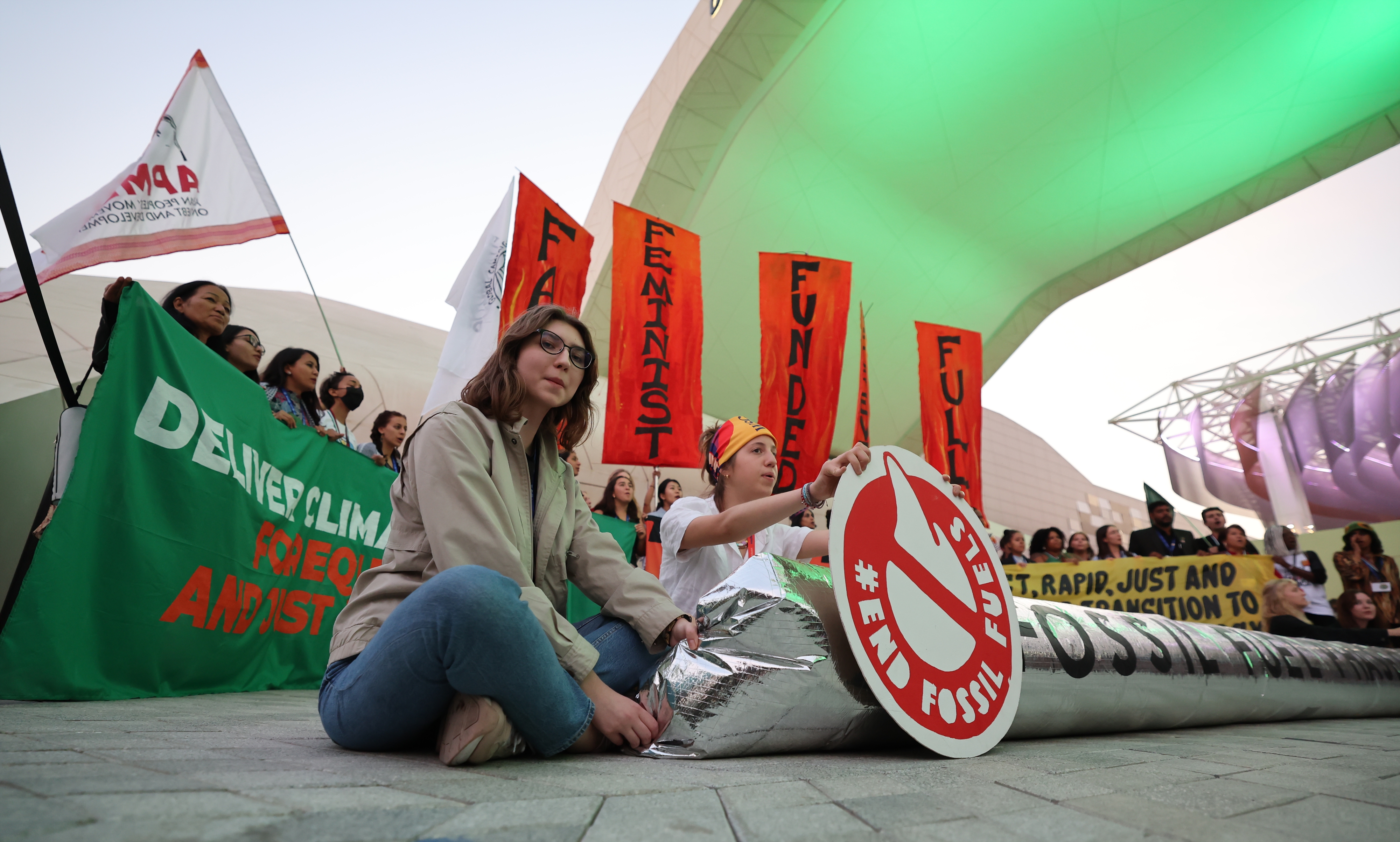The draft will set the stage for a final round of contentious negotiations in the two-week summit in Dubai, which has laid bare deep international divisions over whether oil, gas and coal should have a place in a climate-friendly future.
COP28 President Sultan Al Jaber urged the nearly 200 countries at the talks to redouble their efforts to finalize a deal ahead of the scheduled close of the conference on Tuesday, saying they "still have a lot to do".
"You know what remains to be agreed. And you know that I want you to deliver the highest ambition on all items including on fossil fuel language," he said.
U.N. Secretary General Antonio Guterres has said a central benchmark of success for COP28 will be whether it yields a deal to phase out fossil fuels fast enough to avert disastrous climate change.
The new draft of a COP28 agreement, published by the United Arab Emirates' presidency of the summit, proposed various options but did not refer to a "phase out" of all fossil fuels, which had been included in a previous draft.
Instead it listed eight options that countries "could" use to cut emissions, including: "reducing both consumption and production of fossil fuels, in a just, orderly and equitable manner so as to achieve net zero by, before, or around 2050".
Other actions listed included tripling renewable energy capacity by 2030, "rapidly phasing down unabated coal" and scaling up technologies including those to capture CO2 emissions to keep them from the atmosphere.
A coalition of more than 100 countries including big oil and gas producers the United States, Canada and Norway, as well as the European Union and island nations, wanted an agreement that included language to phase out fossil fuels, a feat not achieved in 30 years of the U.N. summits. The emissions from burning fossil fuels are by far the main driver of climate change.
The U.S. State Department called for the draft agreement language to be strengthened, while the European Union said the new text was disappointing.
"We appreciate the effort on the part of many to produce the text, which seeks to balance a variety of interests," the State Department said in a statement. "At the same time, the mitigation section, including the issue of fossil fuels, needs to be substantially strengthened."
EU chief negotiator Wopke Hoekstra told reporters: "It is lengthy, we're still looking into all the various elements. And yes, there are a couple of things in there. But overall, it is clearly insufficient, and not adequate to addressing the problem we are here to address."
Representatives from Pacific island nations Samoa and the Marshall Islands, already suffering the impacts of rising seas, said the draft was a death warrant.
"We will not go silently to our watery graves," said John Silk, the head of the Marshall Islands delegation.
"We cannot sign on to a text that does not have strong commitment on phasing out fossil fuels," Samoa environment minister Cedric Schuster told reporters.
A new draft document is expected on early Tuesday, which would leave little time for further disagreement ahead of the conference's scheduled close at 0700 GMT. COP summits rarely finish on schedule.
Sources familiar with the discussions said the UAE had come under pressure from Saudi Arabia, de facto leader of the OPEC oil producers' group of which UAE is a member, to drop any mention of fossil fuels from the text.
Saudi Arabia's government did not respond to requests for comment on Monday.
It was unclear if China, currently the world's top greenhouse gas emitter, supported the draft.
Leaving their pavilion, senior members of the China delegation, including chief envoy Xie Zhenhua, did not respond to questions.
But observers noted that some of the language in the document was in line with China's previous policy positions, as well as the Sunnylands agreement signed by China and the United States in November.
The Sunnylands agreement did not use contentious phrases like "phasing out" but instead called for the accelerated substitution of coal, oil and gas with renewable energy sources, and backed the pledge to triple renewable energy by 2030.
Xie told reporters on Saturday the language in the Sunnylands agreement could provide an opportunity for a breakthrough at COP28.
Brazilian climate negotiator Ana Toni said: "This is an attempt to include the perspectives of all, and not to exclude anyone."
CONSENSUS NEEDED FOR ANY DEAL
For oil-producing nations, a global deal at COP28 to ditch fossil fuels - even without a firm end date - could signal a political willingness from other nations to slash their use of the lucrative products on which fuel-producing economies rely.
Speaking to ministers and negotiators on Sunday, a representative for Saudi Arabia's delegation said a COP28 deal should not pick and choose energy sources, but should instead focus on cutting emissions.
That position echoes a call made by OPEC in a letter to its members earlier in the summit, seen by Reuters, which asked them to oppose any language targeting fossil fuels directly.
Deals at U.N. climate summits must be passed by consensus among the nearly 200 countries present. That high bar aims to establish a consensus on the world's next steps to tackle climate change, which individual countries should then make happen through their national policies and investments.
Developing nations have said any COP28 deal to overhaul the world's energy system must be matched with sufficient financial support to help them do this.
"We need support as developing countries and economies for a just transition," said Colombia's Environment Minister Susana Muhamad said. Colombia supports a COP28 deal to phase out fossil fuels.
Despite the rapid growth of renewable energy, fossil fuels still produce around 80% of the world's energy.
Negotiators told Reuters that other OPEC and OPEC+ members including Russia, Iraq and Iran, have also resisted attempts to insert a fossil fuel phase-out into the COP28 deal.
(Reporting by Kate Abnett, Valerie Volcovivi, David Stanway, Sarah McFarlane, Maha el Dahan, Elizabeth Piper and Gloria Dickie; Editing by Katy Daigle, Sonali Paul, Timothy Heritage, Nick Macfie, Alex Richardson and David Evans)





 Activists protest at the COP28 Conference in Dubai, United Arab Emirates, 11 December 2023. The 2023 United Nations Climate Change Conference (COP28), runs from 30 November to 12 December, and is expected to host one of the largest number of participants in the annual global climate conference as over 70,000 estimated attendees, including the member states of the UN Framework Convention on Climate Change (UNFCCC), business leaders, young people, climate scientists, Indigenous Peoples and other relevant stakeholders will attend. EPA-EFE/ALI HAIDER
Activists protest at the COP28 Conference in Dubai, United Arab Emirates, 11 December 2023. The 2023 United Nations Climate Change Conference (COP28), runs from 30 November to 12 December, and is expected to host one of the largest number of participants in the annual global climate conference as over 70,000 estimated attendees, including the member states of the UN Framework Convention on Climate Change (UNFCCC), business leaders, young people, climate scientists, Indigenous Peoples and other relevant stakeholders will attend. EPA-EFE/ALI HAIDER